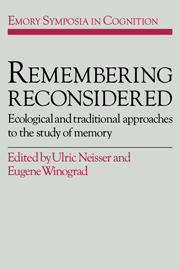Book contents
- Frontmatter
- Contents
- Preface
- List of contributors
- 1 New vistas in the study of memory
- 2 Continuities between ecological and laboratory approaches to memory
- 3 Memory for randomly sampled autobiographical events
- 4 Ordinary everyday memories: Some of the things of which selves are made
- 5 Walking in our own footsteps: Autobiographical memory and reconstruction
- 6 Memory observed and memory unobserved
- 7 The maintenance of marginal knowledge
- 8 The content and organization of autobiographical memories
- 9 The ontogeny of memory for real events
- 10 The functions of event memory: Some comments on Nelson and Barsalou
- 11 “The Wreck of the Old 97”: A real event remembered in song
- 12 Passive remembering
- 13 Remembering without experiencing: Memory for reported events
- 14 What is ordinary memory the memory of?
- 15 Go for the skill
- Name index
- Subject index
Preface
Published online by Cambridge University Press: 25 March 2010
- Frontmatter
- Contents
- Preface
- List of contributors
- 1 New vistas in the study of memory
- 2 Continuities between ecological and laboratory approaches to memory
- 3 Memory for randomly sampled autobiographical events
- 4 Ordinary everyday memories: Some of the things of which selves are made
- 5 Walking in our own footsteps: Autobiographical memory and reconstruction
- 6 Memory observed and memory unobserved
- 7 The maintenance of marginal knowledge
- 8 The content and organization of autobiographical memories
- 9 The ontogeny of memory for real events
- 10 The functions of event memory: Some comments on Nelson and Barsalou
- 11 “The Wreck of the Old 97”: A real event remembered in song
- 12 Passive remembering
- 13 Remembering without experiencing: Memory for reported events
- 14 What is ordinary memory the memory of?
- 15 Go for the skill
- Name index
- Subject index
Summary
This is the second volume in the Emory Symposia in Cognition series. It was originally conceived in a seminar on memory that the two of us conducted together in the fall of 1984–a seminar characterized, like all Cognition Project seminars, by a vigorous airing of many different points of view. Although we devoted a good deal of time and thought to the ecological approach (as is also typical of Cognition Project seminars), more traditional lines of research were not neglected. Indeed, we could not neglect them if we were to do justice to our topic. The study of memory has undergone a remarkable renaissance in the past few years; good ideas and important research have begun to appear from many different directions. There are new findings everywhere: in the naturalistic study of memory, in the laboratory study of basic processes, in development, in neuropsychology, in the understanding of clinical memory disorders. Although we could not do justice to all of those areas in the seminar (nor, alas, in this volume), we did our best to focus on good ideas wherever they might come from. A lot of those good ideas are in this book.
Although the primary goal of the seminar was to understand as much as we could about memory, it was clear that we were working toward a conference as well. The first Emory Cognition Project Conference–whose results have since been published by Cambridge University Press as Concepts and Conceptual Development: Ecological and Intellectual Factors in Categorization (1987)–was held that same fall, and we were pleased with its success.
- Type
- Chapter
- Information
- Remembering ReconsideredEcological and Traditional Approaches to the Study of Memory, pp. vii - viiiPublisher: Cambridge University PressPrint publication year: 1988

